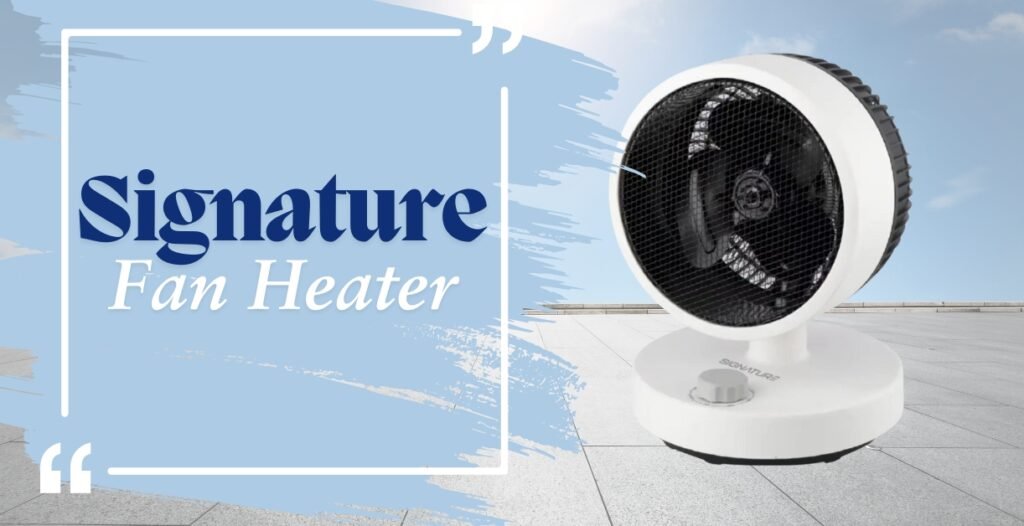As temperatures drop, heaters become essential for keeping homes warm and comfortable. However, many people worry about heaters’ electricity consumption and how it impacts their utility bills. Understanding how much electricity your heater consumes can help you manage energy costs effectively. The price of room heaters in Pakistan also depends on their energy efficiency. In this blog, we’ll describe the factors influencing heater electricity consumption, common types of heaters, and tips for reducing energy usage.
Understanding Electricity Consumption
Electricity consumption is measured in kilowatt-hours (kWh). To calculate how much energy your heater uses, you need to know its power rating, measured in watts (W), and its daily duration. The formula for calculating electricity consumption is:
Electricity Consumption (kWh) = Power Rating (kW) × Hours Used per Day
For example, if your heater, like Signature Electric Heater HT70, has a power rating of 1500 watts (1.5 kW) and operates for 5 hours daily:
1.5 kW × 5 hours = 7.5 kWh per day
Multiply this by the cost per kWh your electricity provider charges to estimate daily or monthly fees.

Factors Influencing Heater Electricity Consumption
Several factors affect how much electricity your heater consumes:
- Type of Heater
Different types of heaters have varying energy efficiency levels. For instance:
- Electric resistance heaters (e.g., fan heaters) consume more electricity as they convert electrical energy directly into heat.
- Oil-filled radiators retain heat for a longer time, making them more energy-efficient.
- Infrared heaters directly heat objects and people, reducing wasted energy.
- Thermostat Settings
Higher thermostat settings lead to increased energy consumption. Lowering the temperature by even a few degrees can result in significant savings.
- Insulation of Your Home
Well-insulated homes retain heat better, reducing the workload on your heater. Poor insulation forces the heater to run longer, consuming more electricity.
- Duration of Use
The longer you use your heater, the more electricity it consumes. Limiting usage during non-peak hours or using timers can help manage energy costs.
- Heater Efficiency
Modern heaters often have energy-saving features, such as programmable thermostats, eco-modes, and automatic shut-off functions, which reduce electricity usage.
Types of Heaters and Their Electricity Usage
Here’s a breakdown of common heater types and how much electricity they typically consume:
- Fan Heaters
- Power Rating: 1000-2000 watts
- Usage: Best for small rooms or quick heating.
- Consumption: A 1500-watt fan heater running for 4 hours consumes 6 kWh daily.
- Oil-Filled Radiators
- Power Rating: 500-2000 watts
- Usage: Ideal for medium to large rooms and prolonged use.
- Consumption: A 1200-watt radiator operating for 6 hours consumes 7.2 kWh daily.
- Infrared Heaters
- Power Rating: 300-1500 watts
- Usage: Suitable for spot heating and outdoor spaces.
- Consumption: A 1000-watt infrared heater running for 5 hours uses 5 kWh daily.
- Panel Heaters
- Power Rating: 400-1500 watts
- Usage: Effective for evenly heating rooms.
- Consumption: A 1000-watt panel heater running for 8 hours consumes 8 kWh daily.
- Space Heaters with Thermostats
- Power Rating: 750-1500 watts
- Usage: Flexible for various room sizes.
- Consumption: A 750-watt space heater operating for 10 hours consumes 7.5 kWh daily.
Tips to Reduce Electricity Consumption
To lower your heater’s electricity usage without compromising comfort, consider the following tips:
- Use Energy-Efficient Heaters
Invest in heaters with high energy efficiency ratings. Look for models with programmable thermostats and eco-friendly features.
- Optimize Thermostat Settings
Set your thermostat to the lowest comfortable temperature. Every degree lower can reduce energy consumption by up to 10%.
- Improve Home Insulation
Seal gaps around windows and doors and add insulation to walls and roofs. Curtains and carpets also help retain heat.
- Use Timers and Smart Plugs
Timers and smart plugs allow you to schedule heating periods, ensuring the heater runs only when necessary.
- Layer Up
Wear warm clothing and use blankets to reduce reliance on heaters. This simple habit can significantly cut electricity usage.
- Zone Heating
Heat only the rooms you’re using—close doors to prevent heat from escaping to unused areas.
- Maintain Your Heater
Clean and service your heater regularly to ensure it operates efficiently. Dust and debris can reduce its effectiveness.
- Take Advantage of Sunlight
Open curtains during the day to let natural sunlight warm your home, reducing the need for heating.
Calculating Costs for Common Usage Scenarios
Let’s explore some examples of electricity costs based on heater usage:
Example 1: Small Room Heating
- Heater: 1000-watt fan heater
- Duration: 4 hours/day
- Cost per kWh: Rs. 25
Electricity Consumption: 4 kWh/day Daily Cost: Rs. 100 Monthly Cost: Rs. 3000
Example 2: Large Room Heating
- Heater: 1500-watt oil-filled radiator
- Duration: 6 hours/day
- Cost per kWh: Rs. 25
Electricity Consumption: 9 kWh/day Daily Cost: Rs. 225 Monthly Cost: Rs. 6750
Environmental Impact
Reducing heater electricity consumption not only lowers bills but also benefits the environment. Using less electricity decreases greenhouse gas emissions, contributing to a more sustainable future. Opting for energy-efficient heaters and minimizing usage are small steps toward reducing your carbon footprint.
Conclusion
Understanding your heater’s electricity consumption is crucial for managing energy costs and staying warm efficiently. By choosing the right type of heater, optimizing its usage, and adopting energy-saving habits, you can enjoy a cosy home without overspending on electricity bills.
If you’re looking for energy-efficient heaters, visit Lahore Centre today or call us at 0333 363 3637. We deliver high-quality heaters right to your doorstep, making staying warm and saving money this winter easier!
